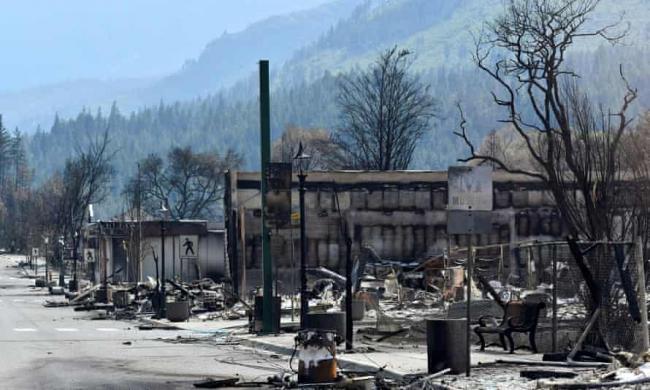Articles Menu

Aug. 6, 2021
A second community in western Canada has been destroyed by wildfire as authorities in the region scramble to contain the destructive toll of climate change.
Officials say the village of Monte Lake likely suffered extensive damage, but conditions remain too dangerous for a full assessment. The village, a popular summer holiday destination, has a seasonal population of nearly 3,000.
On Thursday evening, the White Rock Lake wildfire jumped a highway and sped towards Monte Lake. Residents had been ordered to evacuate and no fatalities were reported.
“I understand from the BC wildfire that this fire moved 18km in a matter of eight hours,” Ken Gillis, chairman of the Thompson-Nicola Regional District, told the Canadian Press on Friday. “I’ve talked to a number of firefighters who said this year’s fires are behaving in a manner that they have never seen before. They’re just exceedingly aggressive and it’s almost impossible to get ahead of them.”
Strong winds are expected to help the blaze, which already measures 325 sq km, grow even stronger.
The blaze at Monte Lake comes a month after a wildfire destroyed most of the village of Lytton, killing two people.
More than 220 provincial firefighters are currently working to prevent the White Rock Lake from inflicting further damage on nearby communities, using heavy machinery to build control lines in the hopes of steering the fire.
But the wildfire service warned the situation remained “incredibly volatile” and could worsen over the next two days.
The city of Kamloops, where many evacuees from the Lytton fire have taken shelter, has placed several of its south-eastern neighbourhoods on evacuation alert.
The chance of rain in the coming days is likely to bring momentary relief to cities like Kamloops – but the longer range forecast suggests hot and dry weather is returning. Nearly 300 fires are currently burning in the province.
Experts have linked a brutal heatwave earlier in the summer, as well as persistently dry conditions, to climate change, warning it is likely to make extreme weather events like wildfire a more common occurrence in the future.
British Columbia has seen nearly 5,800 sq km of its forest burned since the spring, with months still left in the fire season.
[Top photo: The charred remnants of homes and buildings in Lytton last month. Two people were killed in the Lytton blaze and most of the town destroyed. Photograph: Jennifer Gauthier/Reuters]